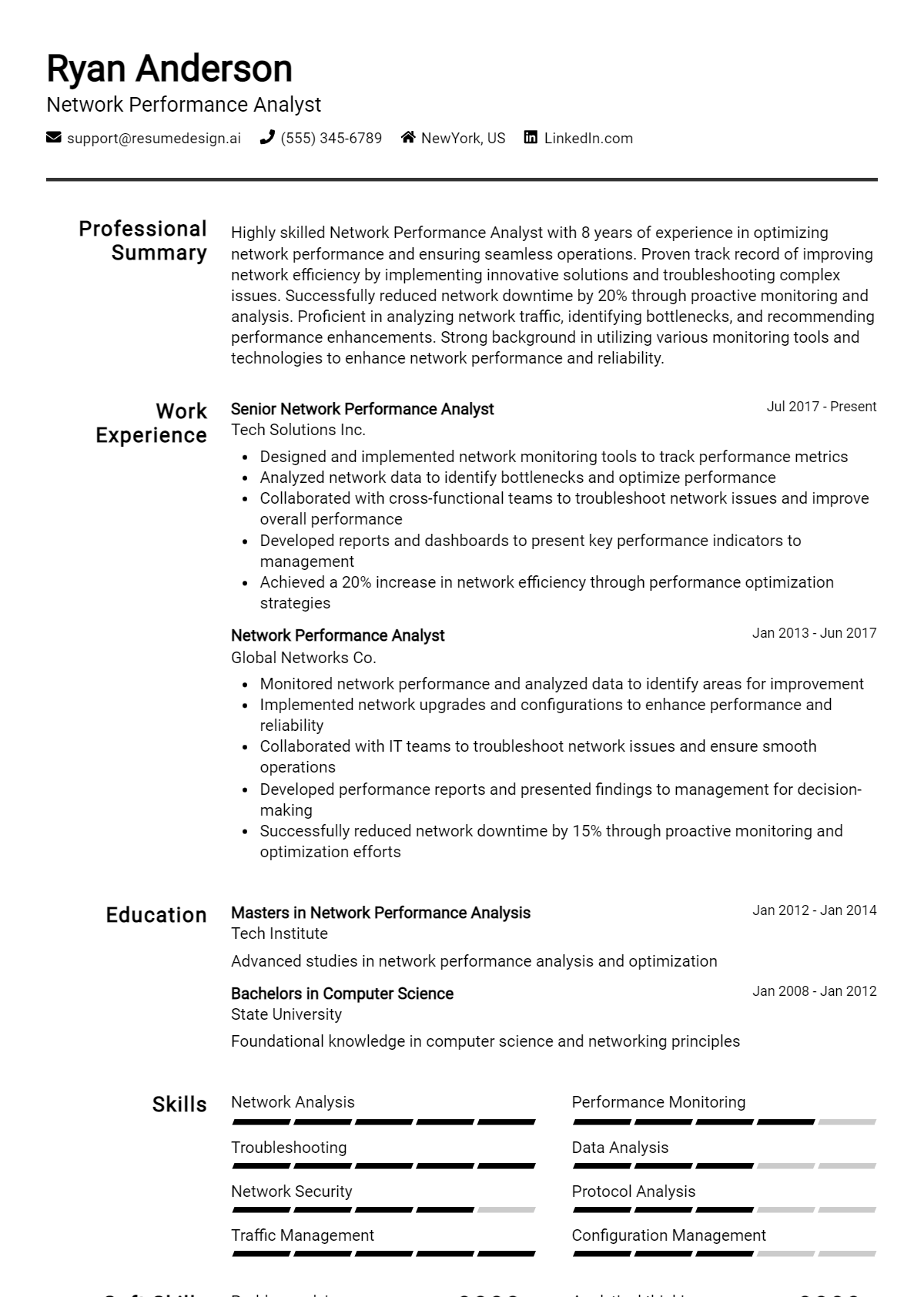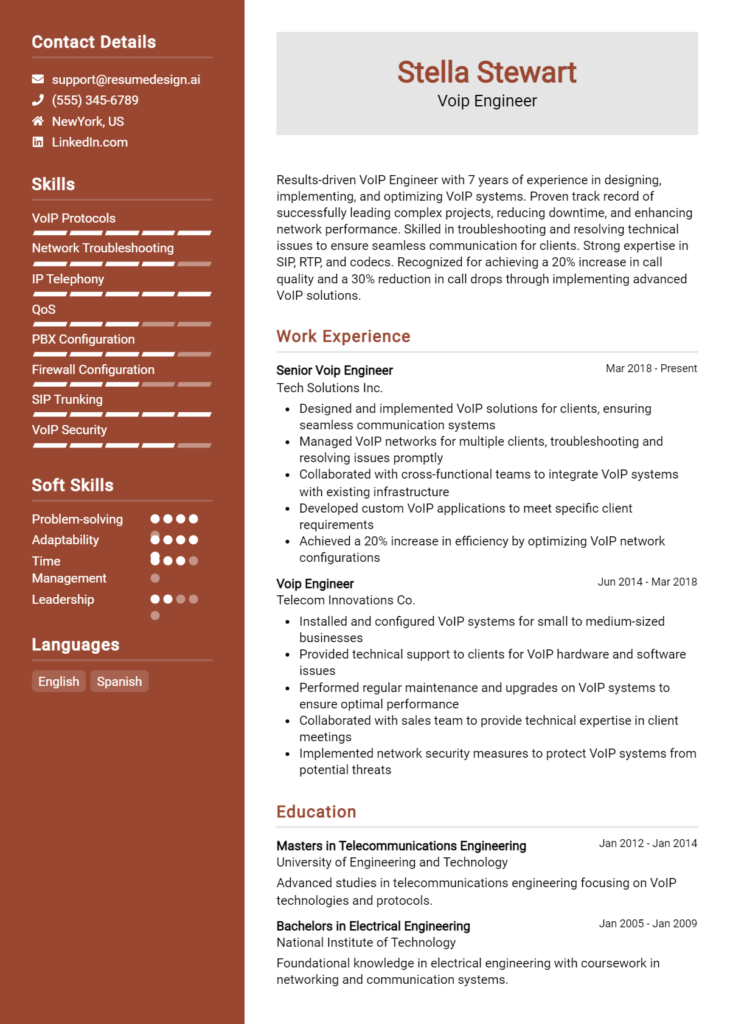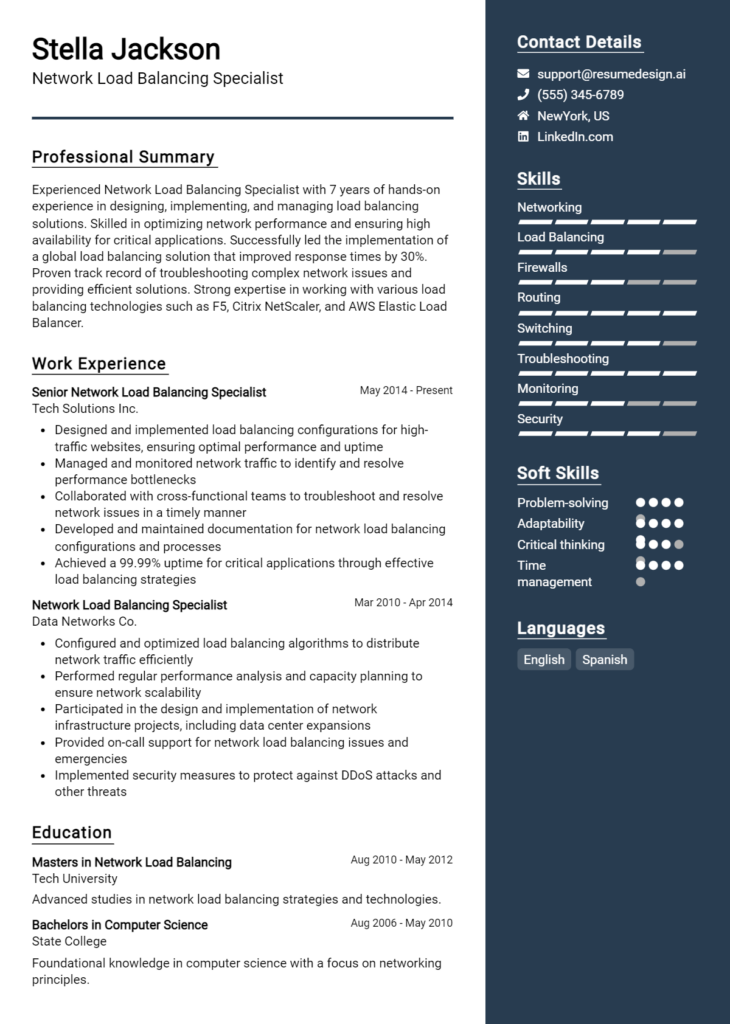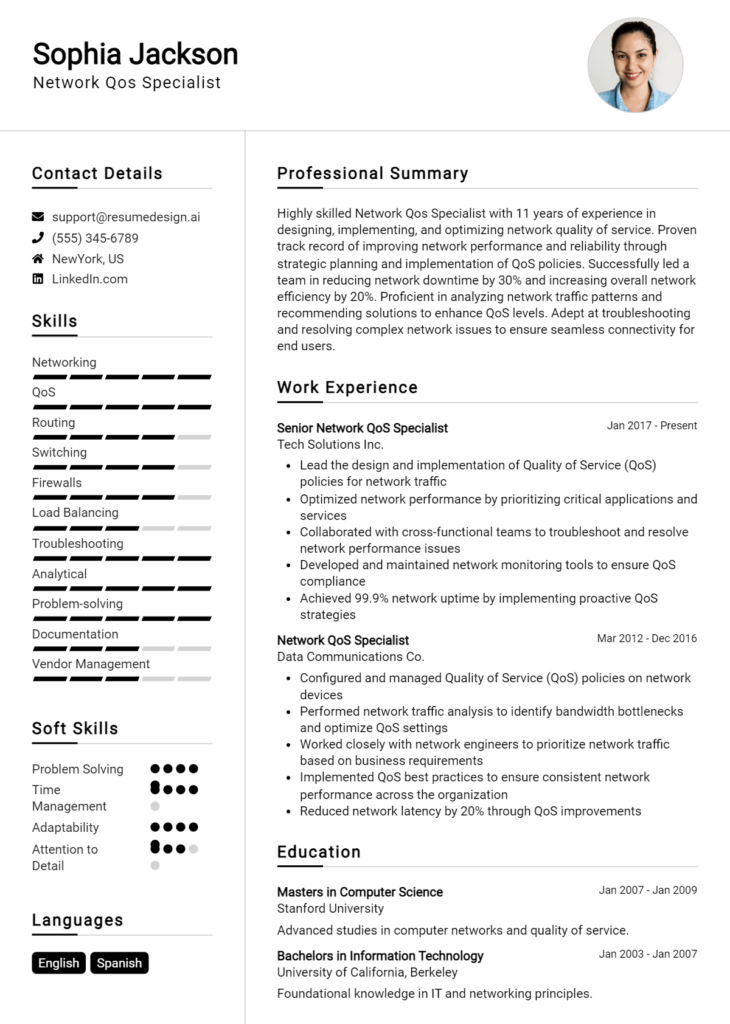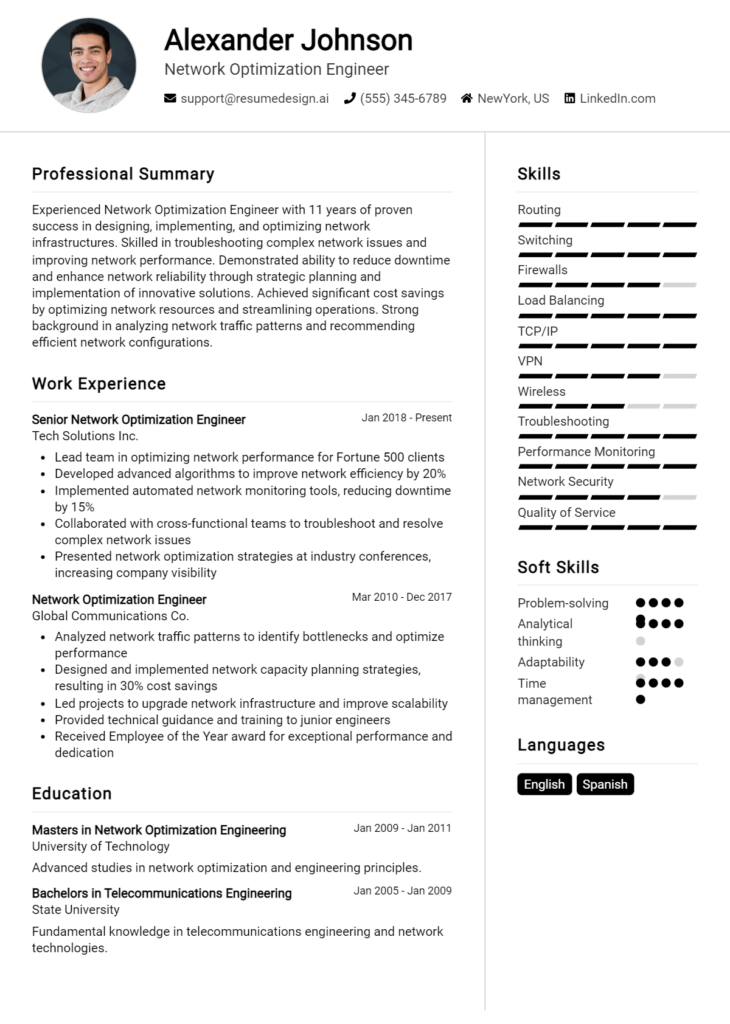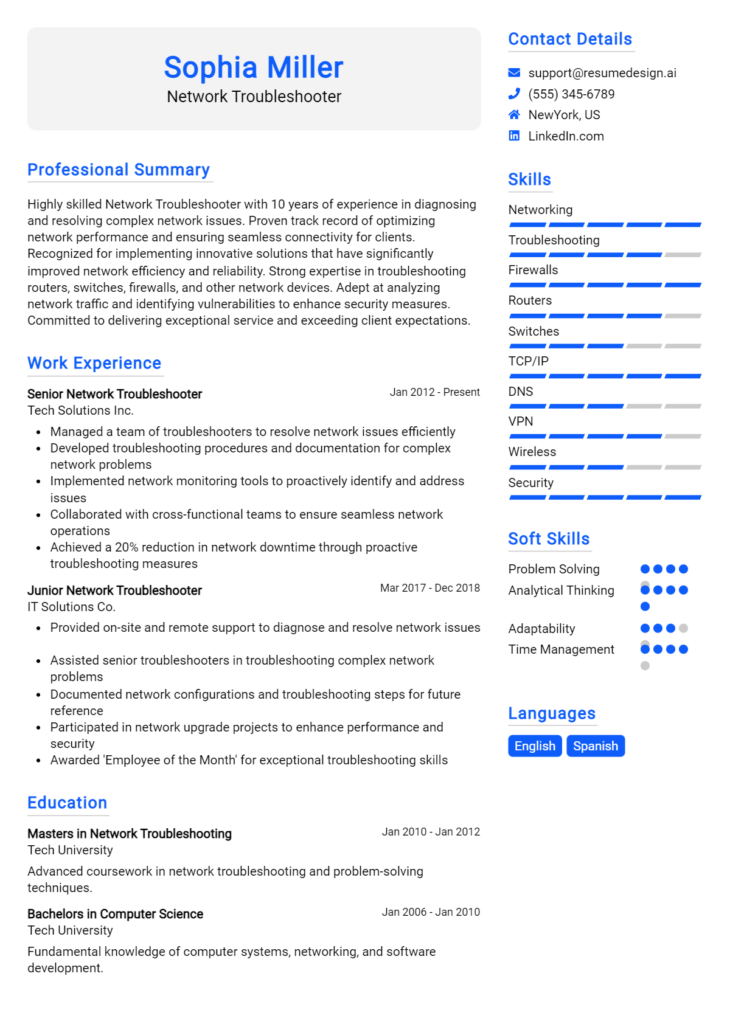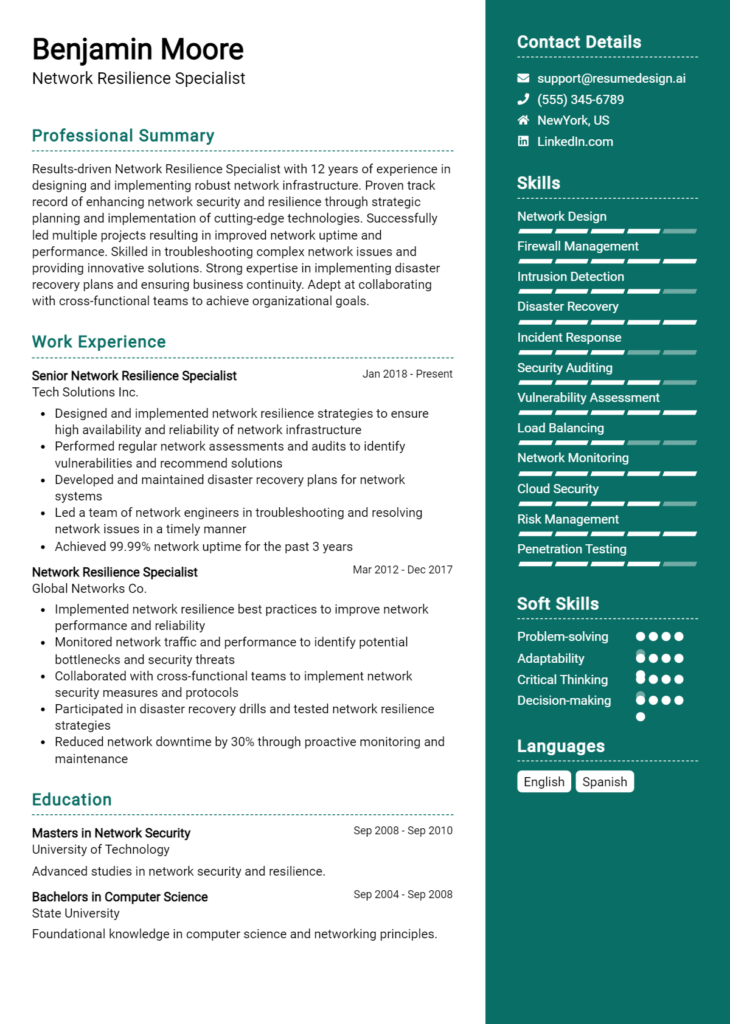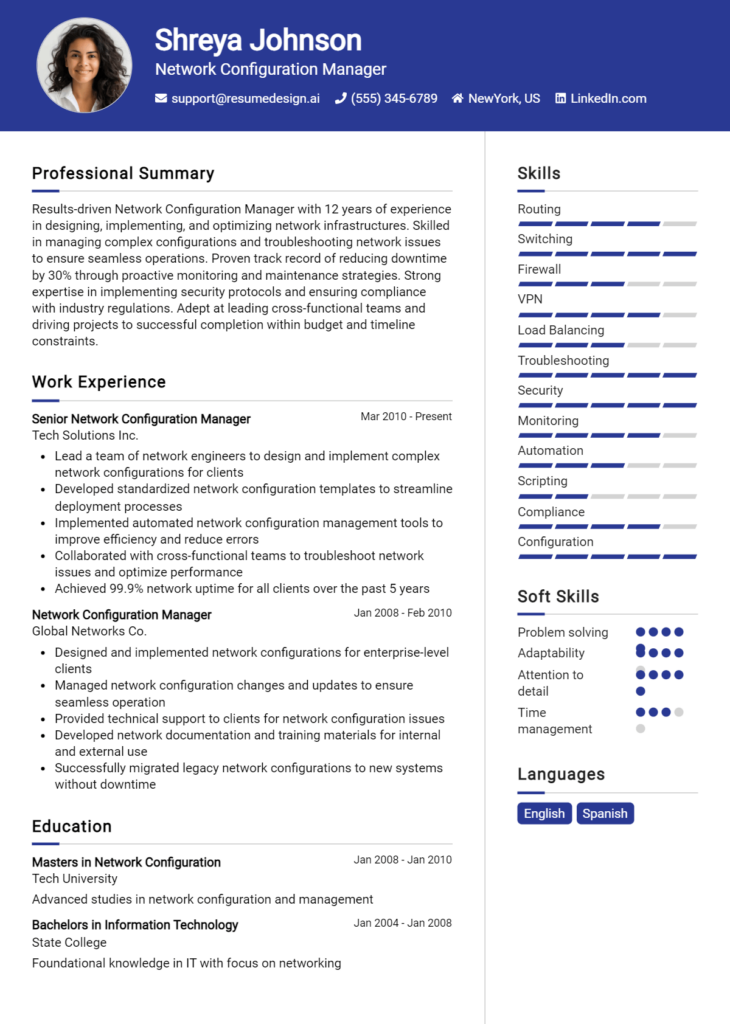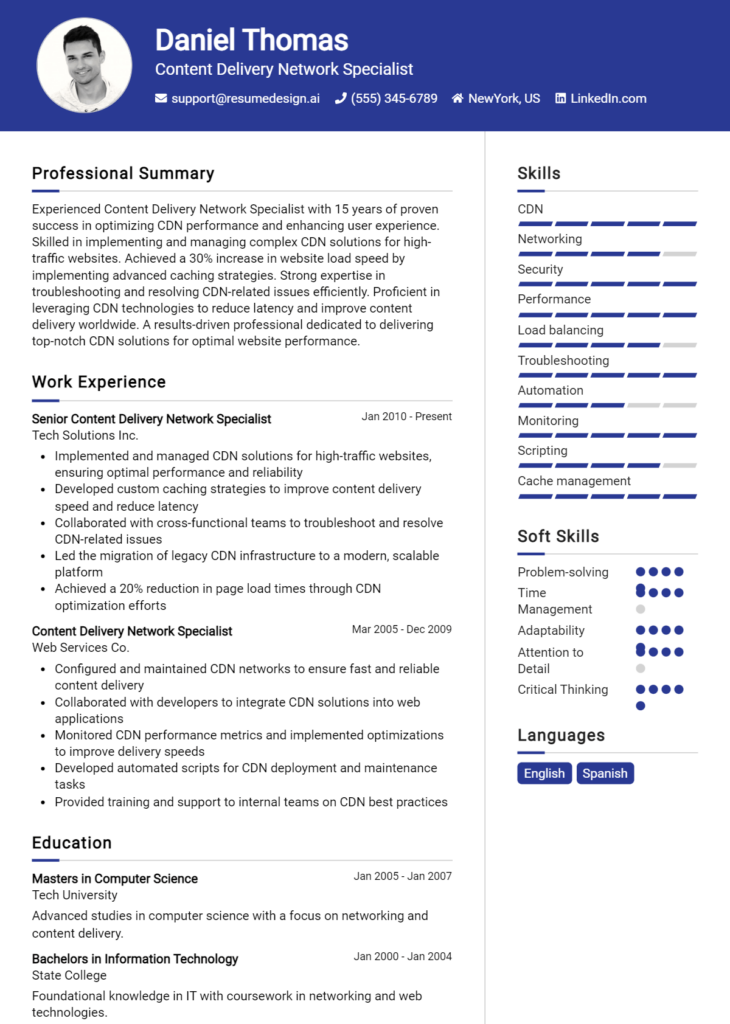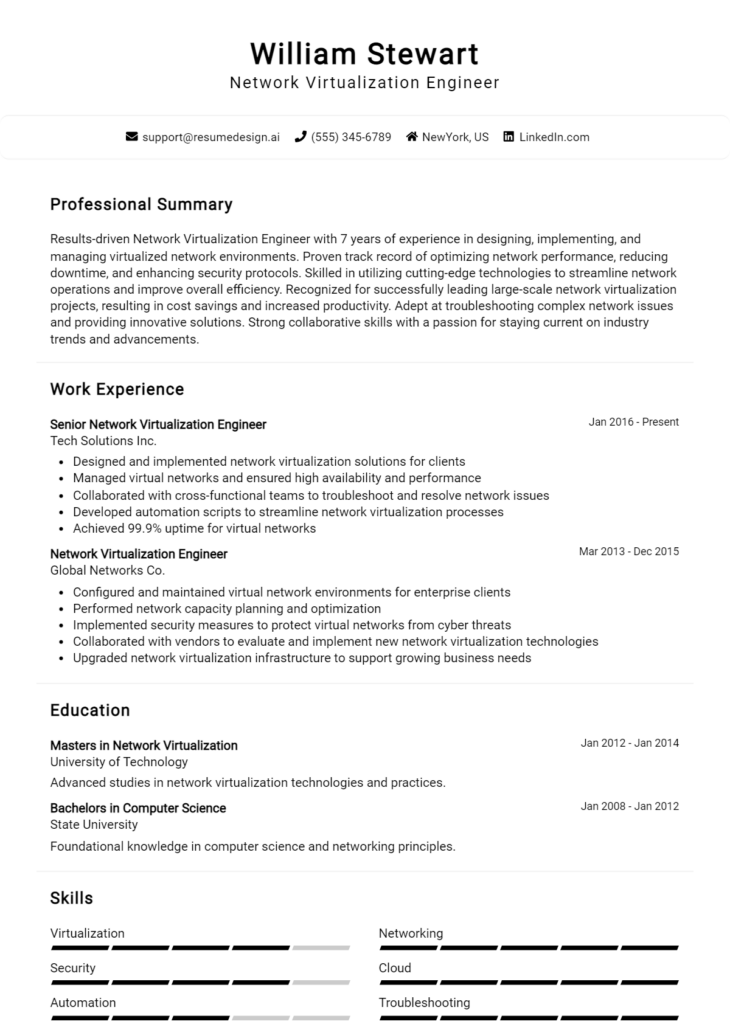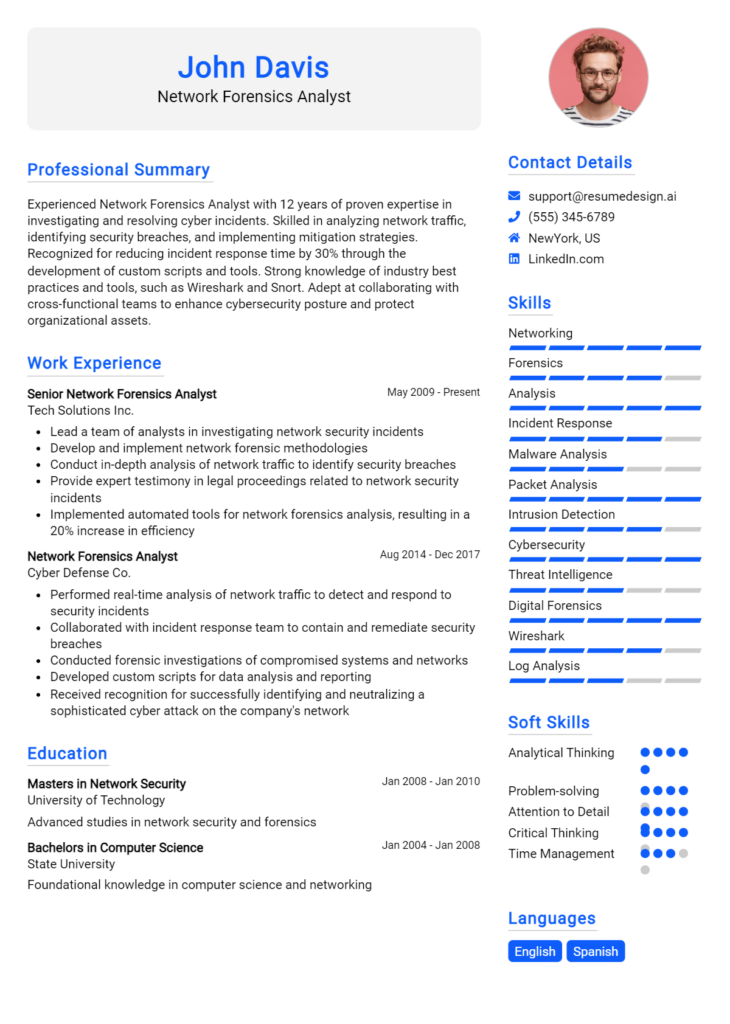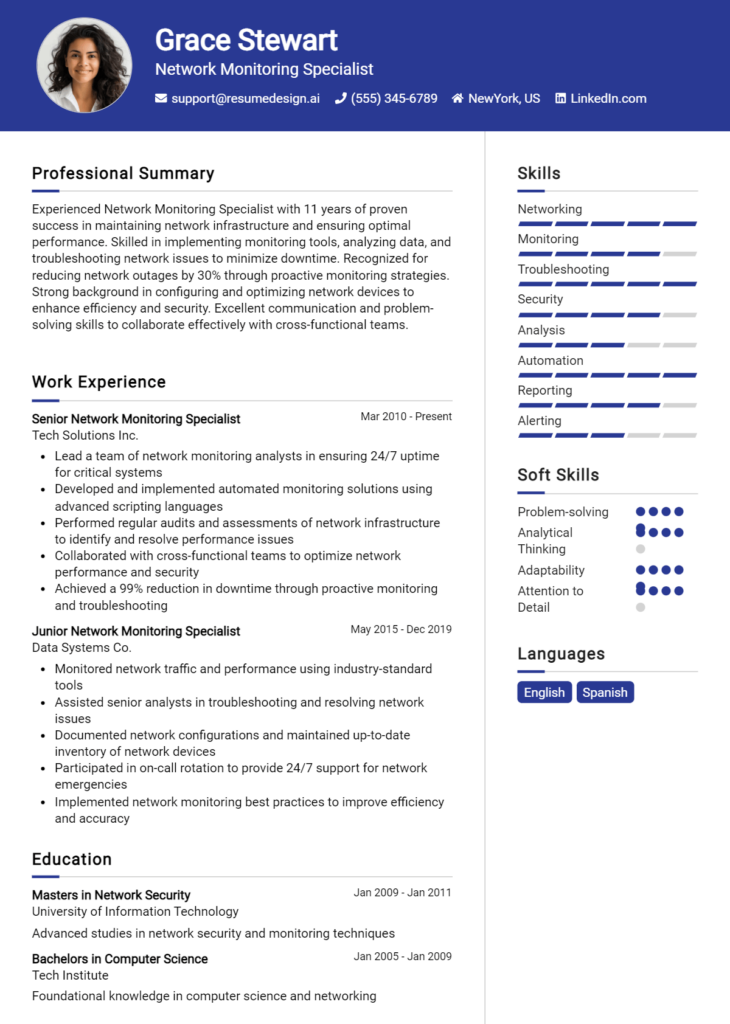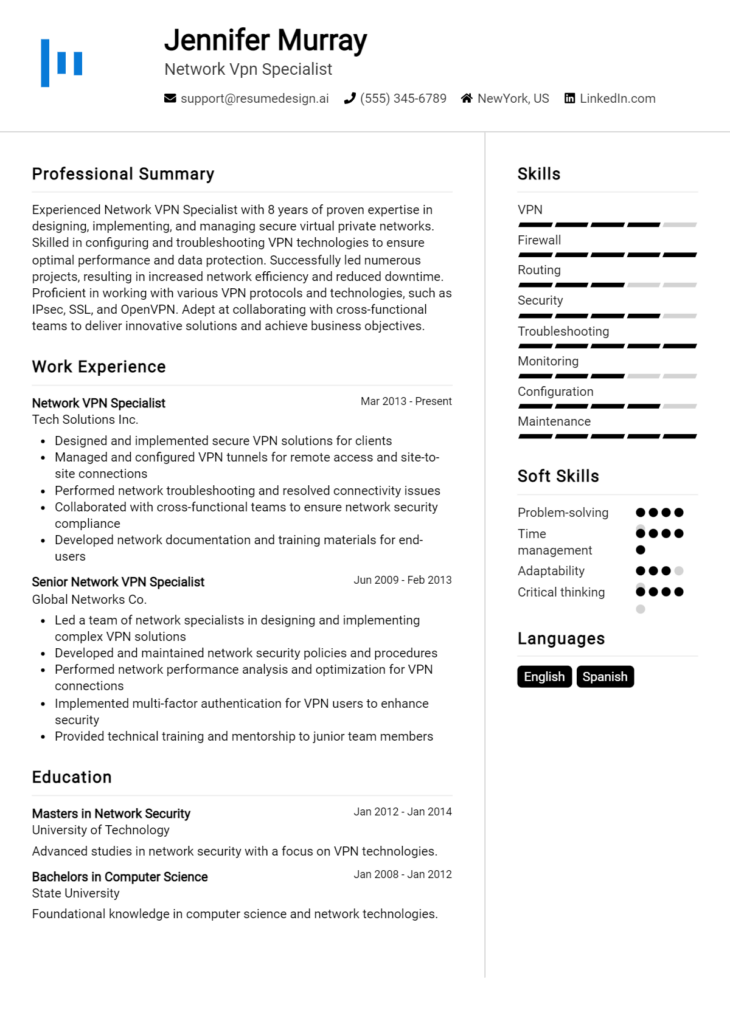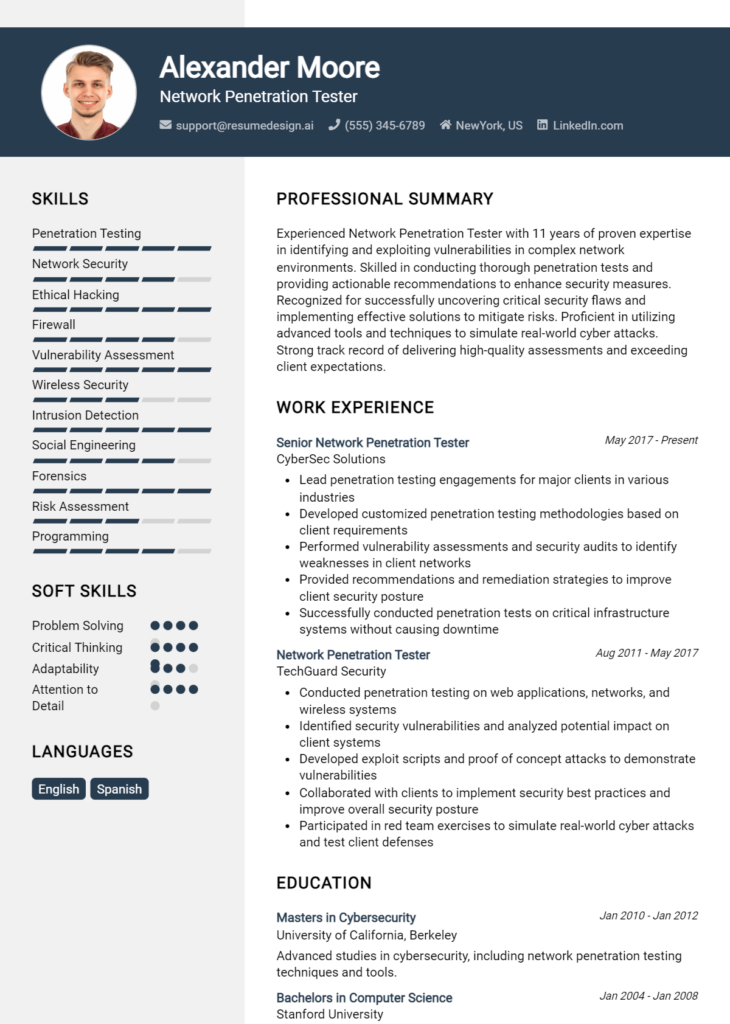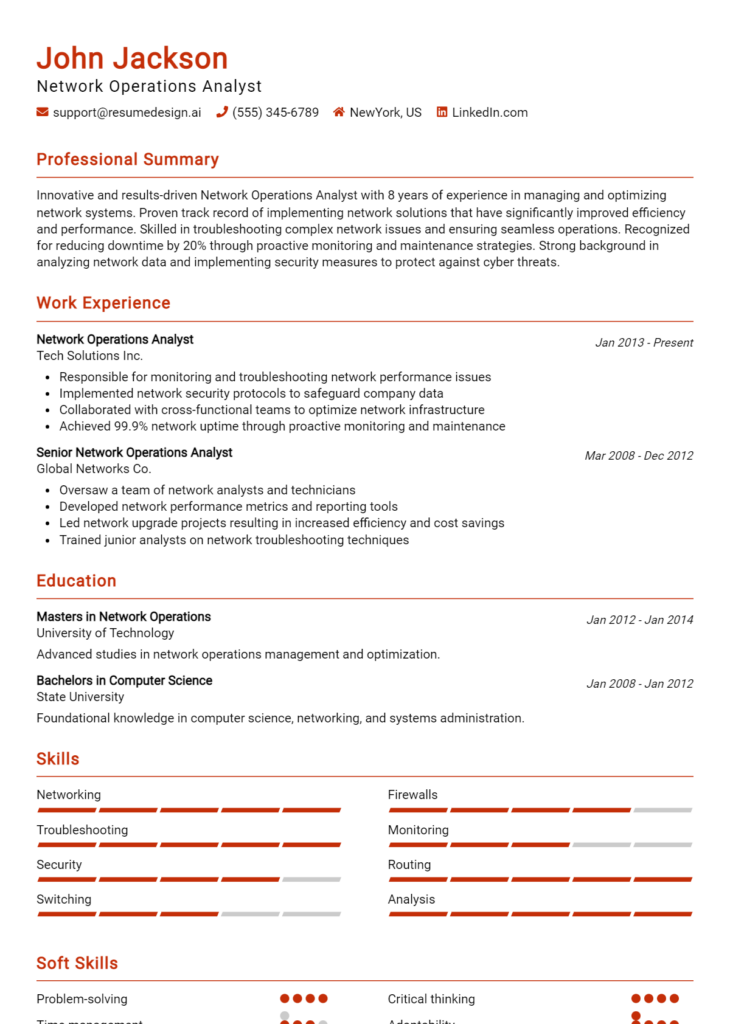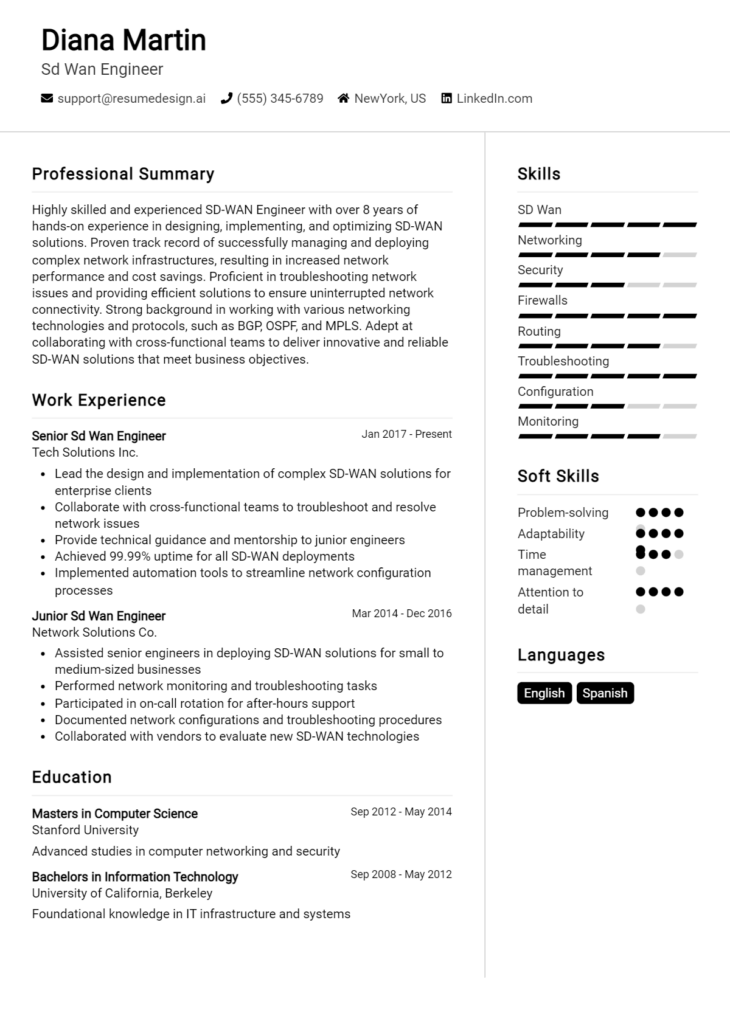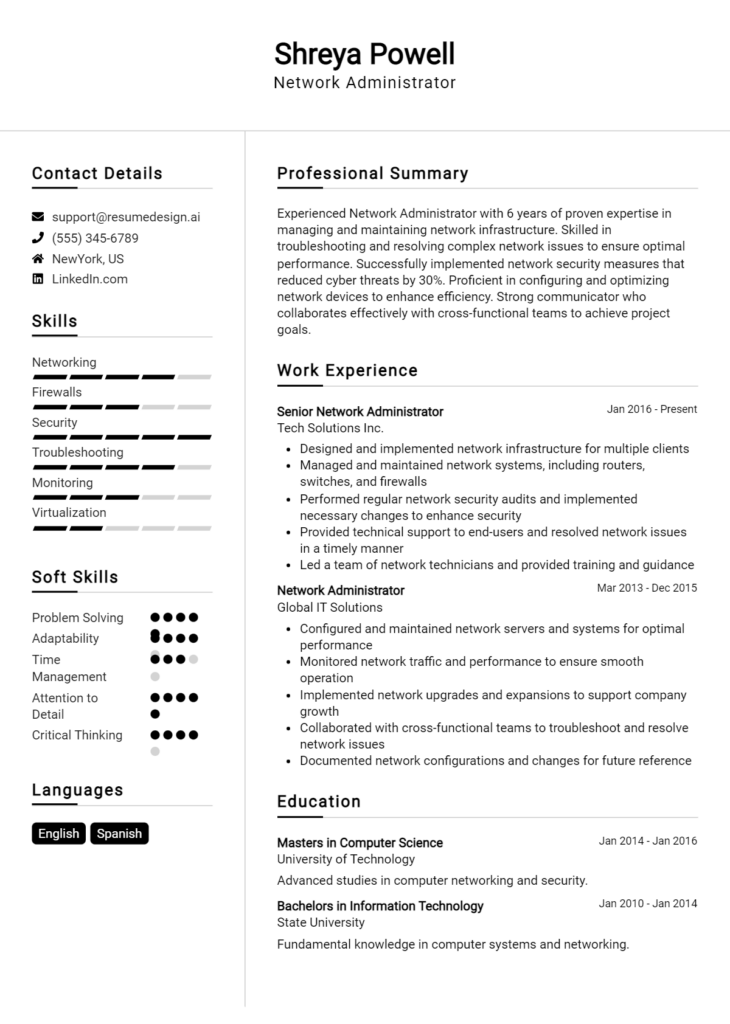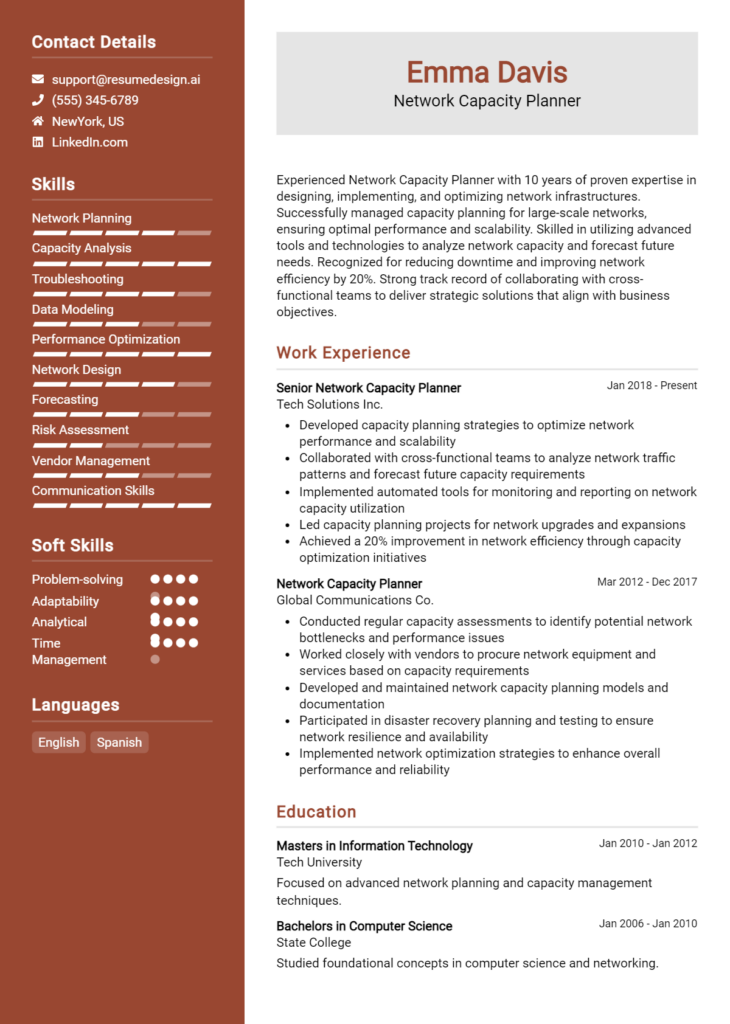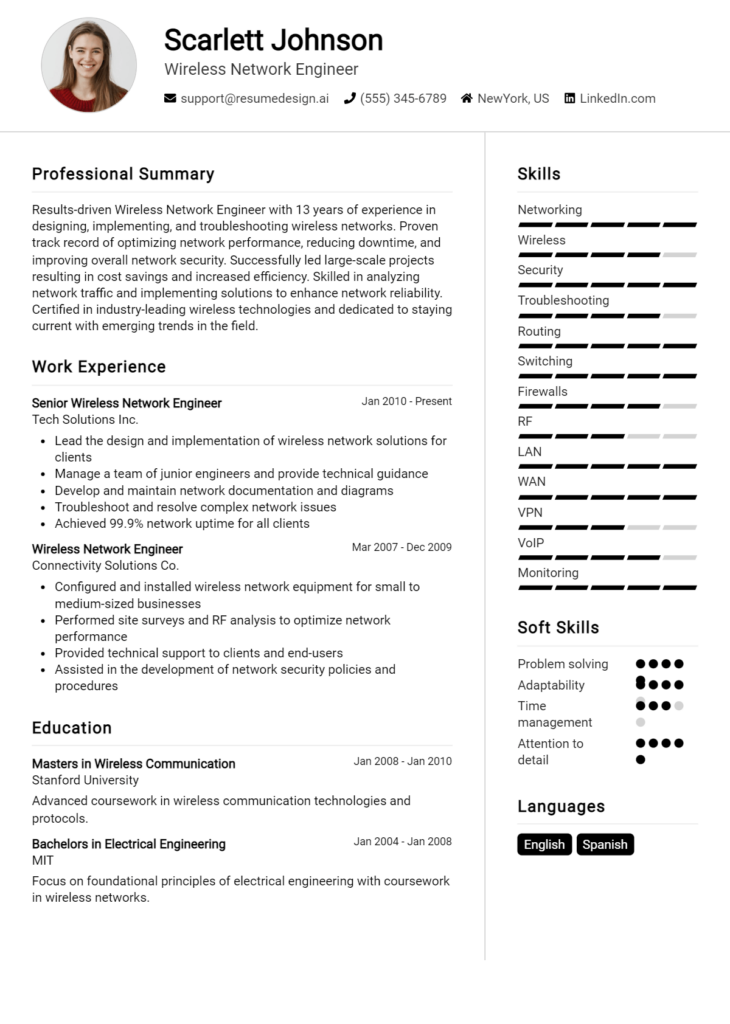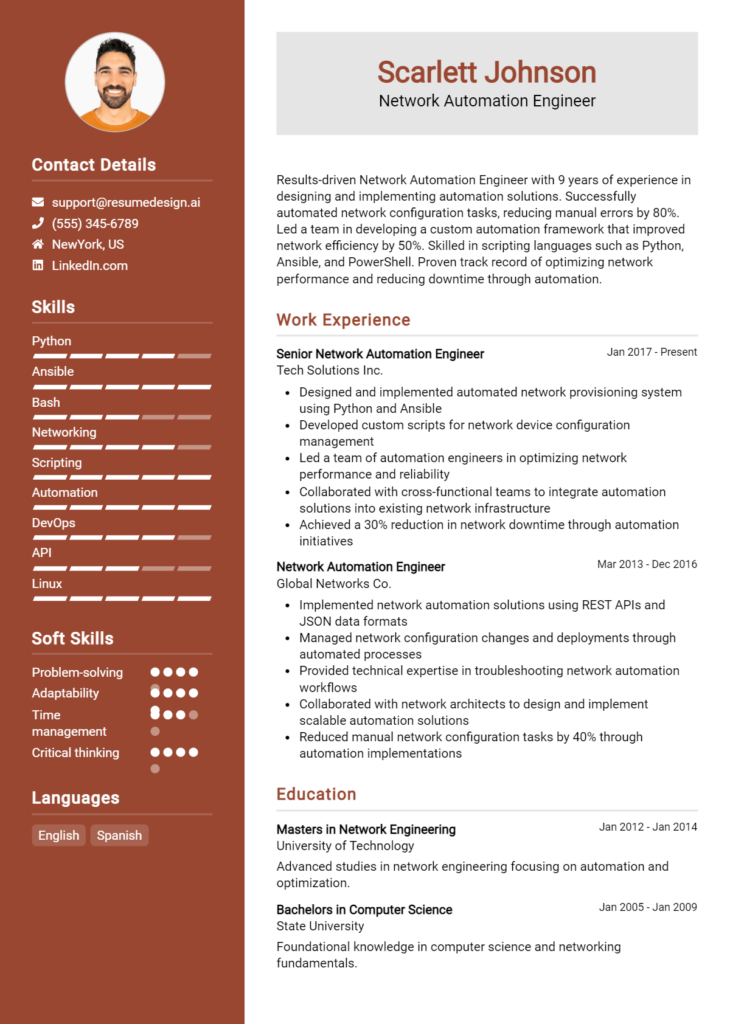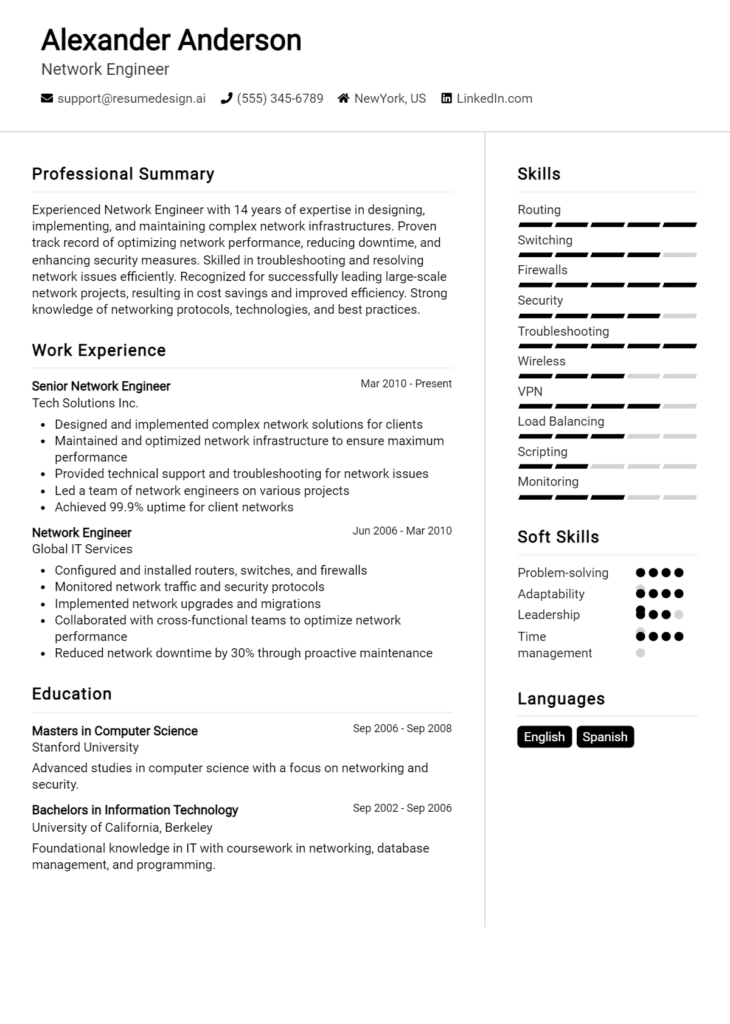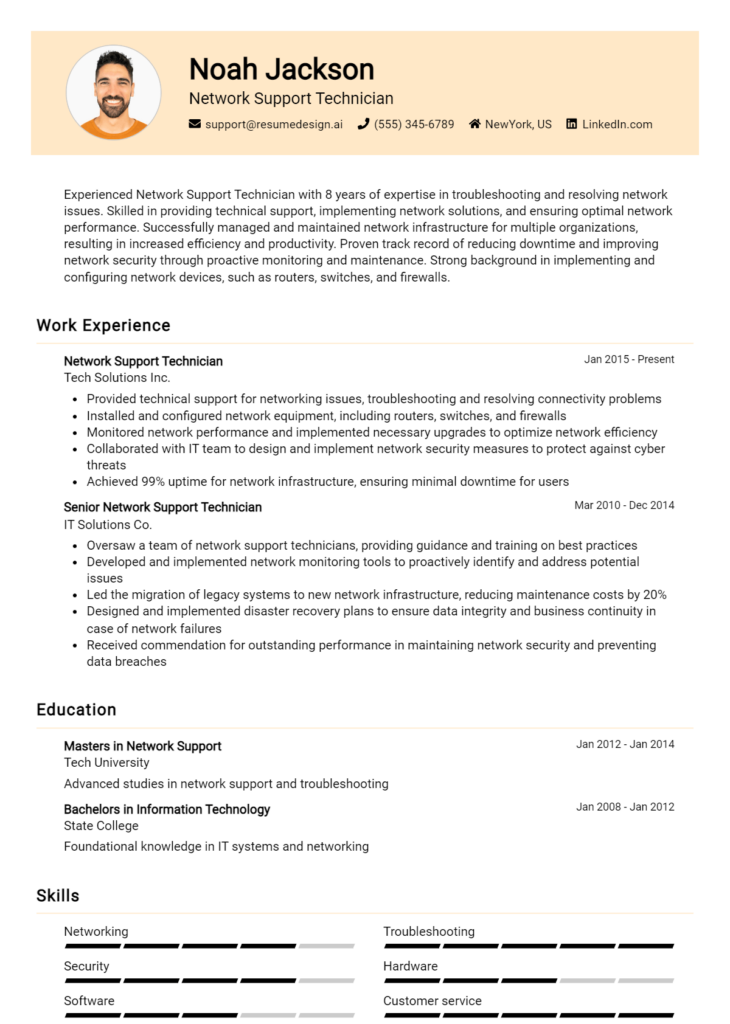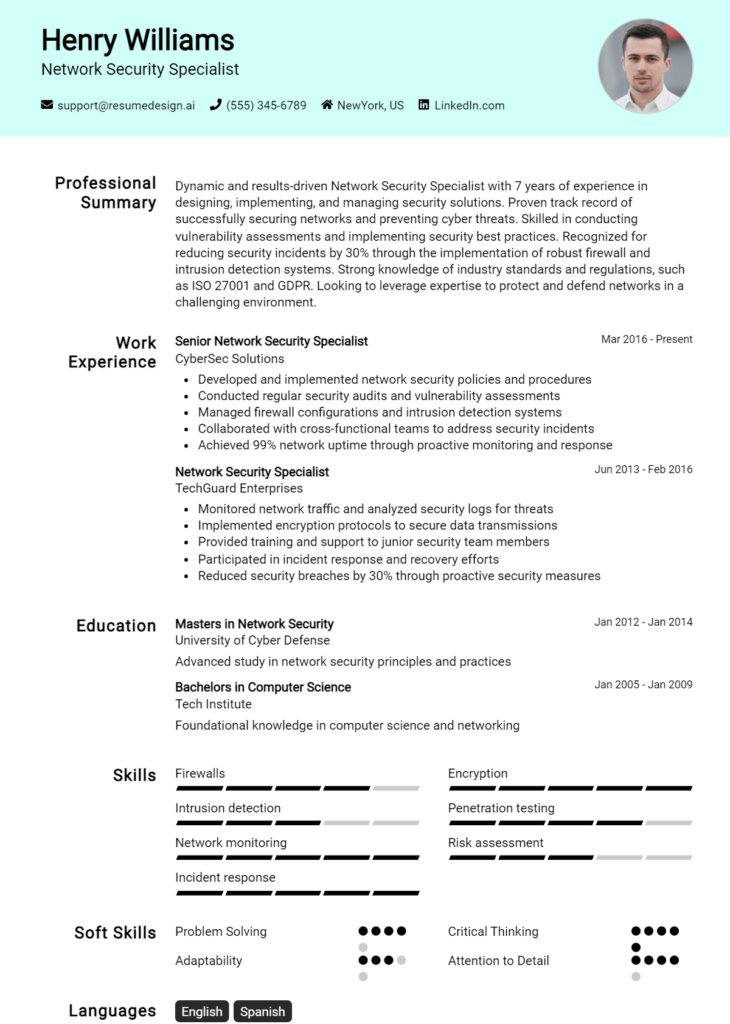Network Performance Analyst Core Responsibilities
A Network Performance Analyst plays a crucial role in optimizing the performance of an organization’s network infrastructure. Their core responsibilities include monitoring network performance metrics, analyzing data to identify bottlenecks, and collaborating with IT, operations, and management teams to enhance network efficiency. Essential skills include strong analytical abilities, technical proficiency in network tools, and effective problem-solving capabilities. These competencies are vital for achieving organizational goals, and a well-structured resume can effectively highlight these qualifications to prospective employers.
Common Responsibilities Listed on Network Performance Analyst Resume
- Monitor and analyze network performance metrics to ensure optimal functionality.
- Identify and troubleshoot network issues to minimize downtime.
- Collaborate with cross-functional teams to improve network infrastructure.
- Prepare detailed reports on network performance and improvement recommendations.
- Implement performance monitoring tools and software.
- Conduct regular network assessments and audits.
- Assist in the design and implementation of network upgrades.
- Maintain documentation of network configurations and changes.
- Train staff on best practices for network usage and performance.
- Stay updated on industry trends and emerging technologies.
- Evaluate vendor performance and manage relationships.
High-Level Resume Tips for Network Performance Analyst Professionals
In the competitive landscape of technology and networking, a well-crafted resume is essential for Network Performance Analyst professionals seeking to make a strong first impression on potential employers. The resume serves as a candidate's initial introduction, showcasing not only their technical skills but also their achievements and contributions to previous roles. It is crucial for the document to effectively reflect the unique qualifications that align with the demands of the position. This guide will provide practical and actionable resume tips specifically tailored for Network Performance Analyst professionals, enabling candidates to create a compelling narrative that stands out in a crowded job market.
Top Resume Tips for Network Performance Analyst Professionals
- Tailor your resume to the job description by incorporating relevant keywords and phrases that align with the specific requirements of the role.
- Highlight your technical expertise in network performance monitoring tools, protocols, and methodologies to demonstrate your proficiency.
- Showcase relevant experience by detailing past roles and responsibilities that specifically pertain to network analysis and performance optimization.
- Quantify your achievements with metrics such as percentage improvements in network uptime, latency reductions, or cost savings achieved through your initiatives.
- Include industry-specific certifications such as CCNA, CCNP, or other relevant qualifications that enhance your credibility and expertise.
- Emphasize soft skills that complement your technical abilities, such as problem-solving, communication, and teamwork, which are vital in collaborative environments.
- Utilize a clean, professional format that enhances readability and allows key information to stand out to hiring managers quickly.
- Incorporate a summary statement at the top of your resume that encapsulates your experience and goals, tailored to the specific role you are applying for.
- List relevant projects or case studies that demonstrate your hands-on experience and successful outcomes in network performance improvement.
Implementing these tips can significantly increase your chances of landing a job in the Network Performance Analyst field. By creating a resume that not only highlights your skills and accomplishments but also aligns closely with the expectations of potential employers, you position yourself as a strong candidate ready to contribute to an organization’s success in network performance management.
Why Resume Headlines & Titles are Important for Network Performance Analyst
In the competitive field of network performance analysis, a resume headline or title plays a pivotal role in capturing the attention of hiring managers. A well-crafted headline not only serves as a first impression but also succinctly summarizes a candidate's key qualifications and expertise in one impactful phrase. A strong headline should be concise, relevant, and directly related to the job being applied for, ensuring that it resonates with the specific skills and experiences sought by employers. By effectively highlighting a candidate’s strengths, a compelling resume title can significantly enhance their chances of standing out in a crowded job market.
Best Practices for Crafting Resume Headlines for Network Performance Analyst
- Keep it concise: Aim for a headline that is no more than 10-12 words.
- Be specific: Tailor your headline to directly reflect the job description.
- Highlight key skills: Include essential technical skills or certifications relevant to network performance analysis.
- Use impactful language: Choose strong action verbs or adjectives that convey your expertise.
- Showcase experience: Mention years of experience or significant achievements to boost credibility.
- Focus on results: If applicable, quantify your impact with metrics or outcomes.
- Stay relevant: Ensure that every word in your headline serves a purpose related to the job role.
- Keep it professional: Maintain a formal tone that aligns with industry standards.
Example Resume Headlines for Network Performance Analyst
Strong Resume Headlines
"Results-Driven Network Performance Analyst with 5+ Years of Experience in Optimizing Network Efficiency"
“Certified Network Analyst Specializing in Performance Monitoring and Troubleshooting Solutions”
“Dynamic Network Performance Expert Committed to Enhancing System Reliability and Security”
Weak Resume Headlines
“Network Analyst Looking for a Job”
“Experienced Professional in IT”
The strong headlines are effective because they are specific, relevant, and highlight key qualifications that align with the role of a Network Performance Analyst. They provide a clear picture of the candidate's expertise and accomplishments, making them memorable to hiring managers. In contrast, the weak headlines fail to impress due to their vagueness and lack of focus, leaving employers uncertain about the candidate's actual qualifications and suitability for the position. By avoiding generic phrases and instead embracing targeted, impactful language, candidates can significantly elevate their resumes and increase their likelihood of landing interviews.
Writing an Exceptional Network Performance Analyst Resume Summary
A resume summary is a critical component for a Network Performance Analyst as it serves as the first impression hiring managers receive about a candidate. A well-crafted summary quickly captures attention by succinctly showcasing key skills, relevant experience, and notable accomplishments that align with the specific job role. This brief yet impactful section should be tailored to reflect the unique requirements of the position, making it easier for hiring managers to see how a candidate can contribute to their organization right from the start.
Best Practices for Writing a Network Performance Analyst Resume Summary
- Quantify Achievements: Use numbers to demonstrate your impact, such as percentage improvements in network performance or cost savings achieved.
- Focus on Key Skills: Highlight specific technical skills relevant to network performance analysis, such as proficiency in network monitoring tools and data analysis.
- Tailor the Summary: Customize your summary for each application by incorporating keywords and requirements from the job description.
- Keep it Concise: Aim for 3-5 sentences that are clear and to the point, avoiding unnecessary jargon or fluff.
- Showcase Relevant Experience: Briefly mention past roles or projects that directly relate to network performance analysis.
- Use Action-Oriented Language: Start sentences with strong action verbs to convey confidence and proactivity.
- Highlight Certifications: If applicable, mention any relevant certifications that enhance your qualifications for the role.
- Convey Passion: Include a statement that reflects your enthusiasm for network performance and improving system efficiencies.
Example Network Performance Analyst Resume Summaries
Strong Resume Summaries
Results-driven Network Performance Analyst with over 5 years of experience in optimizing network infrastructure for Fortune 500 companies. Achieved a 30% reduction in latency through the implementation of advanced monitoring tools and strategic data analysis.
Detail-oriented Network Performance Analyst skilled in utilizing tools like SolarWinds and Wireshark to assess network performance metrics. Successfully improved bandwidth utilization by 25% while reducing operational costs by $50,000 annually.
Dedicated professional with extensive experience in network troubleshooting and performance optimization. Spearheaded a network upgrade project that increased overall system uptime from 95% to 99.9%, significantly enhancing user satisfaction.
Weak Resume Summaries
Experienced analyst looking for a position in network performance. I have worked with networks and am familiar with various tools.
Network Performance Analyst with some experience in the field. I hope to contribute to a company that values performance analysis.
The examples of strong resume summaries are considered effective because they quantify achievements, specify relevant skills, and clearly demonstrate how past experiences relate to the job role. In contrast, the weak summaries lack detail and specificity, providing no measurable outcomes or clear indications of the candidate's qualifications. This makes it difficult for hiring managers to gauge the candidate's potential contributions to the organization.
Work Experience Section for Network Performance Analyst Resume
The work experience section of a Network Performance Analyst resume is vital in demonstrating the candidate's technical skills and their ability to manage teams effectively while delivering high-quality products. This section not only highlights relevant past roles and responsibilities but also showcases quantifiable achievements that align with industry standards. By presenting clear, measurable outcomes, candidates can illustrate their impact on organizational performance and network optimization, making them more appealing to potential employers.
Best Practices for Network Performance Analyst Work Experience
- Highlight relevant technical skills, such as proficiency in network monitoring tools and data analysis software.
- Use quantifiable results to demonstrate the impact of your contributions, such as percentage improvements in network efficiency.
- Emphasize collaboration by detailing your experience working with cross-functional teams.
- Showcase leadership capabilities by mentioning any roles in guiding or mentoring junior analysts.
- Align your experience with industry standards, using terminology and metrics familiar to hiring managers.
- Include specific projects that reflect your problem-solving skills and innovative approaches to network issues.
- Keep descriptions concise while ensuring they convey the significance of your contributions.
- Tailor your work experience to match the job description of the position you are applying for.
Example Work Experiences for Network Performance Analyst
Strong Experiences
- Led a team of 5 analysts to optimize network performance, resulting in a 30% reduction in latency and a 25% increase in throughput over six months.
- Developed and implemented a new monitoring system that decreased incident response time by 40%, enhancing overall network reliability.
- Collaborated with engineering teams to roll out a major network upgrade, successfully completing the project 2 weeks ahead of schedule and under budget.
- Analyzed network traffic patterns to identify and resolve bottlenecks, achieving a 50% improvement in data transfer speeds across multiple sites.
Weak Experiences
- Worked on network projects with various teams.
- Participated in meetings about network performance improvements.
- Involved in monitoring network systems occasionally.
- Helped with data analysis tasks as needed.
The examples provided illustrate a clear distinction between strong and weak experiences. Strong experiences are characterized by specific, quantifiable outcomes and demonstrate leadership and collaboration in significant projects. They provide a clear picture of the candidate's impact on the organization. Conversely, weak experiences lack detail and fail to convey measurable results or the candidate's specific contributions, making them less impressive to potential employers.
Education and Certifications Section for Network Performance Analyst Resume
The education and certifications section of a Network Performance Analyst resume plays a crucial role in showcasing a candidate's academic foundation, relevant industry certifications, and commitment to continuous professional development. This section serves as a vital indicator of the candidate's qualifications and expertise, demonstrating their ability to analyze and optimize network performance effectively. By including pertinent coursework, recognized certifications, and specialized training, candidates can enhance their credibility and show alignment with the specific demands of the job role, thereby increasing their chances of being selected for interviews.
Best Practices for Network Performance Analyst Education and Certifications
- Include only relevant degrees and certifications that pertain to network performance analysis.
- Highlight advanced certifications such as CCNP, CCIE, or other industry-recognized qualifications.
- Provide specific coursework details that are directly applicable to network optimization and analysis.
- List certifications in chronological order, emphasizing the most recent and relevant ones first.
- Consider including ongoing professional development courses or training to demonstrate continuous learning.
- Be precise in naming the institutions and certifying bodies to enhance credibility.
- Ensure clarity in the formatting to make the education and certifications easily readable.
- Tailor the section to align with the job description and required competencies for the role.
Example Education and Certifications for Network Performance Analyst
Strong Examples
- Bachelor of Science in Computer Networking, XYZ University, 2022
- Certified Network Performance Analyst (CNPA), Network Certification Board, 2023
- Coursework: Advanced Network Performance Analysis, Traffic Engineering, and Network Security
- Cisco Certified Network Professional (CCNP), Cisco, 2023
Weak Examples
- Associate Degree in Liberal Arts, ABC College, 2020
- Microsoft Office Specialist Certification, Microsoft, 2019
- Coursework: Introduction to Psychology, Basic Mathematics
- Outdated CompTIA A+ Certification, CompTIA, 2018
The strong examples are considered effective because they directly relate to the skills and knowledge required for a Network Performance Analyst role, showcasing relevant degrees and industry-recognized certifications that validate the candidate's expertise. In contrast, the weak examples highlight irrelevant qualifications that do not align with the job's technical requirements, demonstrating a lack of focus on the necessary competencies for network performance analysis.
Top Skills & Keywords for Network Performance Analyst Resume
In the competitive field of network performance analysis, having the right skills is paramount for standing out to potential employers. A well-crafted resume that highlights both hard and soft skills can significantly enhance your chances of landing an interview. As a Network Performance Analyst, you will be tasked with monitoring, evaluating, and improving network performance, making it essential to showcase your technical expertise alongside interpersonal abilities. Including a comprehensive list of relevant skills not only demonstrates your qualifications but also reflects your understanding of the role's demands. For more insights, you can explore additional skills and how to better present your work experience.
Top Hard & Soft Skills for Network Performance Analyst
Soft Skills
- Analytical Thinking
- Problem-Solving
- Attention to Detail
- Communication Skills
- Team Collaboration
- Adaptability
- Time Management
- Critical Thinking
- Decision-Making
- Customer Service Orientation
Hard Skills
- Network Monitoring Tools (e.g., SolarWinds, Wireshark)
- Performance Metrics Analysis
- TCP/IP Protocols
- Network Configuration and Management
- Data Analysis and Reporting
- Firewall and Security Protocols
- Network Troubleshooting Techniques
- Scripting Languages (e.g., Python, Bash)
- Virtualization Technologies (e.g., VMware)
- Understanding of Cloud Networking (e.g., AWS, Azure)
- Knowledge of Network Topologies
- Familiarity with SNMP and NetFlow
- Experience with Load Balancers
- VoIP and Unified Communications Knowledge
Stand Out with a Winning Network Performance Analyst Cover Letter
As a highly motivated and detail-oriented Network Performance Analyst, I am excited to bring my expertise in network optimization and performance monitoring to your esteemed organization. With a strong background in analyzing network traffic, identifying performance bottlenecks, and implementing strategic solutions, I am confident in my ability to contribute to your team and enhance the efficiency of your network infrastructure. My experience in utilizing industry-standard tools and methodologies allows me to deliver actionable insights that drive performance improvements and support business objectives.
In my previous role at XYZ Corporation, I successfully led several projects focused on optimizing network performance, resulting in a 30% reduction in latency and a 25% improvement in overall network throughput. My ability to collaborate with cross-functional teams and communicate complex technical concepts to non-technical stakeholders has been key to my success. I am skilled in using data analytics to monitor network performance metrics and leverage this information to develop comprehensive reports that inform decision-making and strategic planning.
I am particularly drawn to your organization because of its commitment to innovation and excellence in network performance management. I admire your focus on leveraging cutting-edge technologies to enhance customer experience and operational efficiency. I am eager to contribute my analytical skills and proactive approach to problem-solving to help your team achieve its goals. I believe my passion for continuous improvement and my dedication to delivering high-quality results align perfectly with your company’s vision.
Thank you for considering my application. I look forward to the opportunity to discuss how my skills and experiences align with the needs of your team. I am enthusiastic about the possibility of contributing to your organization as a Network Performance Analyst and am eager to bring my insights and expertise to your esteemed company.
Common Mistakes to Avoid in a Network Performance Analyst Resume
When crafting a resume for a Network Performance Analyst position, it's essential to present your skills and experiences effectively. However, many candidates make common mistakes that can undermine their chances of landing an interview. Understanding these pitfalls can help you create a compelling resume that highlights your qualifications and aligns with the expectations of hiring managers in the field. Below are some frequent missteps to avoid:
Vague Job Descriptions: Failing to provide specific details about your previous roles can leave hiring managers unclear about your actual contributions. Be sure to quantify achievements and describe your responsibilities in detail.
Ignoring Relevant Skills: Not highlighting critical technical skills like network monitoring tools, data analysis techniques, or performance metrics can make your resume less appealing. Tailor your skills section to reflect the requirements of the job description.
Using Jargon Without Explanation: While industry terminology can demonstrate expertise, excessive jargon without context can alienate readers. Ensure that your language is accessible and provides clear explanations of your technical skills.
Omitting Relevant Certifications: Certifications such as Cisco Certified Network Associate (CCNA) or CompTIA Network+ are valuable in this field. Neglecting to list them can make you seem less qualified compared to other candidates.
Poor Formatting: A cluttered or overly complex resume layout can detract from your qualifications. Use clear headings, bullet points, and a consistent format to ensure readability and professionalism.
Focusing on Job Duties Instead of Achievements: Simply listing job duties may not effectively showcase your impact. Instead, emphasize your accomplishments and how you improved network performance or resolved critical issues.
Not Tailoring the Resume for Each Job Application: Sending the same generic resume for multiple positions can be detrimental. Customize your resume to align with the specific requirements and keywords of each job listing.
Neglecting Soft Skills: While technical expertise is crucial, soft skills like communication and teamwork are also important in a Network Performance Analyst role. Be sure to highlight experiences that demonstrate these abilities.
Conclusion
As a Network Performance Analyst, your role is crucial in ensuring the efficiency and reliability of network systems. Throughout this article, we've highlighted essential skills such as data analysis, performance monitoring, and troubleshooting. Understanding network protocols and having strong analytical abilities are vital for identifying and resolving issues that can impact network performance.
In addition, effective communication skills are necessary for collaborating with cross-functional teams and presenting findings to stakeholders. Staying current with industry trends and technologies is also important for continuous improvement in your role.
As you reflect on these key aspects of your profession, take a moment to review your resume. Ensure it showcases your expertise and aligns with the demands of the Network Performance Analyst position. To assist you in this process, consider utilizing tools like resume templates, a resume builder, and resume examples to create a polished and professional document. Don't forget to also check out our cover letter templates to complement your application. Take action today and enhance your resume to reflect your qualifications and stand out in the competitive job market!

